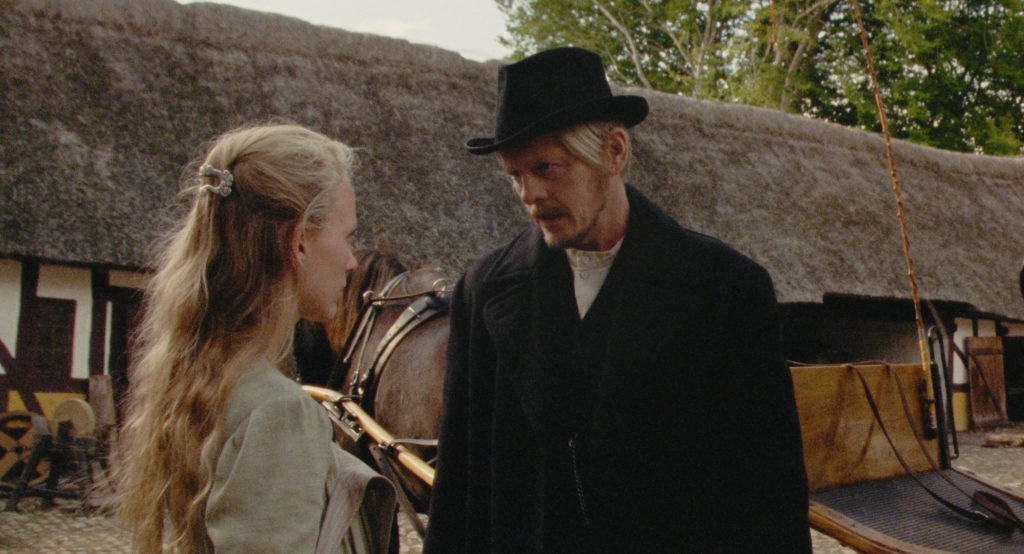Lise Broholm’s Last NightTea Lindeburg’s first film is an adaptation of the autobiographical novel by Marie Bregendahl, published in 1912, In Dodsnat (a night of death), which has become one of the classics of Danish literature.
A period film which, however, offers itself in a truly contemporary perspective, combining oneirism and spirituality in an atmosphere made up of mysteries and tension.
Both the novel and the film explore a young girl’s point of view named Lise (Flora Ofelia Hofmann Lindahl), who lives on a farm with his family, of the Lutheran faithsomewhere in early 20th century Denmark.
It is with the enthusiasm of this young girl that the story begins. Lise is about to become the first woman to be able to leave this rural environment to go to school (which was not yet the case for women at the time) thanks to the help and support of her mother Anna (Ida Cæcilie Rasmussen), who is also about to give birth, and despite her father’s reluctance. She clearly sees in it a means of emancipation, even if a dream she had which seems to indicate a completely different destiny to her: in the middle of a field, the young girl contemplates a threatening cloud which spreads in red streaks. Anna, for her part, who also had a dream which she interprets as prophetic, refuses to have a doctor come to assist her during this long and painful night of childbirth… She prefers to trust the designs of heaven, her fate seeming to have to be entrusted to God… And for Lise then, like a form of the sword of Damocles, then hovers the fear of a real divine punishment.
The film explores Lise’s state of mind and feelings, in her many encounters which give us clues about her view of herself, her sexuality and her family responsibilities. As time passes, it seems Anna’s premonition may be true, filling the young woman with doubts as she is torn between her desire to find a future far from a gloomy present and her inability to to turn his back on his mother, the only person who supported his progressive spirit. All of this led Lise to question her faith and her relationship to God.
It is very interesting to see how Tea manages to use the basis of the novel that she adapts to address universal and very current themes, such as the role and impact of religion. (or of a faith that can go at the risk of fanaticism) – and possibly leading to extremist acts or thoughts -, but without leaving aside a kind of aura that sometimes makes one think of horror films, and putting emphasis on elements that will surely allow female audiences to connect in a more special way with their protagonist. Because it is also a question of femininity, loss of innocence, and existential choices in these moments of transition to adulthood. There is also a kind of rage that emanates from Lise Broholm’s Last Night. This cry of pain from a woman that continues in subsequent scenes – far from the source – as if reverberating in time itself. The fact that Lise’s psyche is shot through with her mother’s anguish is extraordinarily powerful. So to whom or to what should Lise turn her anger and her pain? Maybe going back to the source of the dreams she has that really do look like premonitions…
The visual proposal of this film transports us perfectly to the time in which this story takes place.
The color scheme and design of the production manages to convey a sense of everyday life and authentic rurality, where every scene and every image we see looks like a painting.
It is ultimately an impression of devastation that persists even after the credits. Seeing all of the film’s hopes suddenly in jeopardy certainly isn’t easy to watch… That feeling, however, doesn’t change the fact that the film has a relevance that resonates terribly today.
Everything can so easily go wrong in the blink of an eye and it is much easier to often take refuge in traditional roles than to try to break out of the mould. It is this sad reality that Lindeburg captures through a period film, while making it transposable to our time. There is no doubt that Tea Lindeburg will have much more to say in the years to come, announcing herself here as a director and author with very strong potential.
The last night of Lise Broholm… they had a dream – Regards protestants

